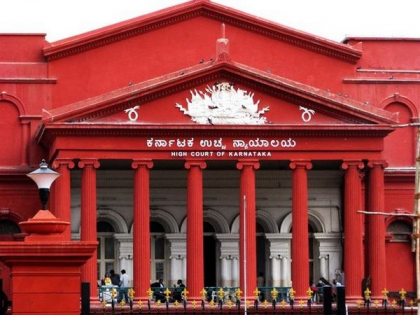Dress code for school students as one homogeneous class serves constitutional secularism, observes Karnataka HC
By ANI | Published: March 15, 2022 07:00 PM2022-03-15T19:00:38+5:302022-03-15T19:10:07+5:30
The Karnataka High Court on Tuesday said the school regulations prescribing dress code for all the students as one homogenous class, serve constitutional secularism and school uniforms promote harmony and spirit of common brotherhood.

Dress code for school students as one homogeneous class serves constitutional secularism, observes Karnataka HC
The Karnataka High Court on Tuesday said the school regulations prescribing dress code for all the students as one homogenous class, serve constitutional secularism and school uniforms promote harmony and spirit of common brotherhood.
A bench of Karnataka High Court comprising Chief Justice Ritu Raj Awasthi, Justice Krishna S Dixit, and Justice JM Khazi observation came while dismissing various pleas challenging a ban on Hijab in educational institutions.
"School uniforms promote harmony and spirit of common brotherhood transcending religious or sectional diversities," Karnataka HC said.
"This apart, it is impossible to instil the scientific temperament which our Constitution prescribes as a fundamental duty vide Article 51A(h) into the young minds so long as any propositions such as wearing of hijab or bhagwa are regarded as religiously sacrosanct and, therefore, not open to question," the court noted.
Further, the Bench said that school uniforms inculcate secular values amongst the students in their impressionable and formative years.
The HC also mentioned that the preamble to the 1983 Act appreciably states the statutory object being "fostering the harmonious development of the mental and physical faculties of students and cultivating a scientific and secular outlook through education."
This also accords with the Fundamental Duty constitutionally prescribed under Article 51A(e) in the same language, as already mentioned above.
The court pointed out that the petitioners' argument that the goal of education is to promote plurality, not promote uniformity or homogeneity, but heterogeneity and therefore, prescription of student uniform offends the constitutional spirit and ideal, is thoroughly misconceived.
"The petitions we are treating do not involve the right to freedom of speech and expression or right to privacy, to such an extent as to warrant the employment of these tests for evaluation of argued restrictions, in the form of school dress code. The complaint of the petitioners is against the violation of essentially 'derivative rights' of the kind. Their grievances do not go to the core of substantive rights as such but lie in the penumbra thereof, " the court said.
The court also mentioned that the Chief Architect of the Constitution observed that more than half a century ago the purdah practice equally applies to wearing the hijab and there is a lot of scope for the argument that insistence on wearing of purdah, veil, or headgear in any community may hinder the process of emancipation of woman in general and Muslim woman in particular.
"That militates against our constitutional spirit of equal opportunity of public participation and positive secularism," the court said in its order.
"Prescription of school dress code to the exclusion of hijab, bhagwa, or any other apparel symbolic of religion can be a step forward in the direction of emancipation and more particularly, to the access to education. It hardly needs to be stated that this does not rob off the autonomy of women or their right to education in as much as they can wear any apparel of their choice outside the classroom," the court added.
The Hijab row had erupted in January this year when the Government PU College in Udupi allegedly barred six girls wearing the hijab from entering. Following this, the girls sat in protest sat outside college over being denied entry.
After this, boys of several colleges in Udupi started attending classes wearing saffron scarves. This protest spread to other parts of the state as well leading to protests and agitations in several places in Karnataka.
As a result, the Karnataka government said that all students must adhere to the uniform and banned both hijab and saffron scarves till an expert committee decides on the issue.
On February 5, the pre-University education board released a circular stating that the students can only wear the uniform approved by the school administration and no other religious attire will be allowed in colleges.
The order stated that in case a uniform is not prescribed by management committees, then students should wear dresses that go well with the idea of equality and unity, and does not disturb the social order.
A batch of petitions was filed against the government's rule in the Karnataka High Court by some girls seeking permission to wear the hijab in educational institutions.
On February 10, the high court issued an interim order stating that said students should not wear any religious attire to classes till the court issues the final order.
The hearings related to the Hijab case were concluded on February 25 and the court had reserved its judgement.
( With inputs from ANI )
Disclaimer: This post has been auto-published from an agency feed without any modifications to the text and has not been reviewed by an editor
Open in app